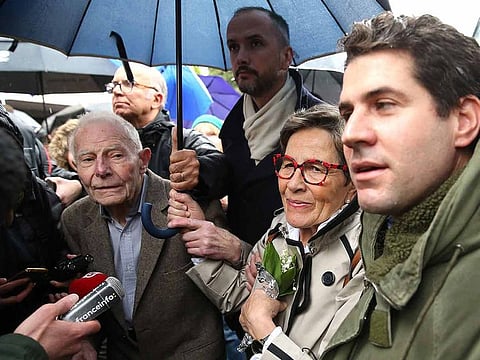French doctors say to end life support in Vincent Lambert case
Lambert, 42, has been in a vegetative state since a 2008 traffic accident

Lille, France: French doctors are set to begin turning off life support on Tuesday for quadriplegic road accident victim Vincent Lambert in what could be the final act in a hugely controversial right-to-die case that has drawn in Pope Francis.
The main doctor treating Lambert, Vincent Sanchez, informed his family by email that he intended to start removing life support in line with a French court ruling last Friday, according to the message which was shared with AFP.
The doctor urged family members to ensure that "support to Mr Vincent Lambert is as peaceful, intimate and personal as possible".
Lambert, 42, has been in a vegetative state since a 2008 traffic accident, with the question of whether to continue keeping him alive artificially bitterly dividing his family and the nation.
After years of legal battles that pitted Lambert's mother against his wife, doctors began removing life support in May before they were forced to reinstate his feeding tubes by a last-minute legal appeal.
But France's top appeals court, the Cour de Cassation, ruled on Friday that life support could be turned off in what was hailed as a definitive legal judgement by a lawyer representing Lambert's wife Rachel.
The case has rekindled a charged debate over France's right-to-die laws, which allow so-called "passive" euthanasia for severely ill or injured patients who are being kept alive with no chance of recovery.
Pope Francis intervened in May when he tweeted to say that it was necessary to "always safeguard life, God's gift, from its beginning until its natural end".
Major events in a six-year legal dispute over his plight
Vegetative state
Lambert, a former psychiatric nurse, suffers severe brain damage in a car accident in 2008 that leaves him a tetraplegic at the age of 32.
He is admitted to hospital in the northeastern city of Reims, where doctors determine in 2011 that he is in a vegetative state without hope of improvement.
In April 2013, the hospital initiates the procedure to cut off life-sustaining intravenous food and water, in line with the wishes of his wife and six of his eight siblings.
His wife and others say Lambert made clear before the accident that he would not want to be kept alive artificially in such circumstances, though this was never put in writing.
But the move is contested by his Catholic parents and two other siblings, who urge a local court to rule that life support should continue, which it does in May 2013.
Taken to higher courts
In January 2014 doctors inform the family for a second time they will stop feeding Lambert intravenously, in line with France's "passive" euthanasia law, which allows doctors to withdraw support for seriously ill or injured patients with no chance of recovery.
But five days later a court rules his treatment must continue, on the request of his parents.
His wife and the hospital appeal to France's supreme administrative court, the State Council, which orders a new medical assessment.
After experts determine that Lambert cannot recover and his condition has even worsened, the council rules in June 2014 that he should be allowed to die.
Lambert's parents take the case to the European Court of Human Rights in Strasbourg, which backs the State Council's decision in June 2015.
In July 2015, the hospital announces for a third time its intention to start procedures to end life support, but days later doctors refuse to follow through, citing security fears as the case enrages pro-life activists.
Off and on again
In September 2017 doctors say they will initiate a new bid, the fourth, to withdraw the life support. Lambert's parents again appeal to the State Council, but they are rejected in January 2018.
They again go to court and request a new medical assessment, which in November concludes that Lambert's chronic vegetative state is irreversible.
In January 2019, a court near Reims upholds the decision to withdraw life support. Lambert's parents renew their appeal to the State Council and the Europe court, but in vain.
In May, a UN committee on disabled rights asks France to suspend any action while it studies the case, though the government says it is not bound by the request.
On May 20, doctors begin the process of ending life support, prompting Pope Francis to say on Twitter that "those who live with severe illness" should have life protected until "its natural end".
Hours later the Paris Court of Appeal orders that life support treatment be resumed for six months to allow the UN committee to complete its review.
On June 28, France's highest appeals court rules that life support can be turned off in what is hailed as a definitive legal judgement by a lawyer representing Lambert's wife Rachel.



